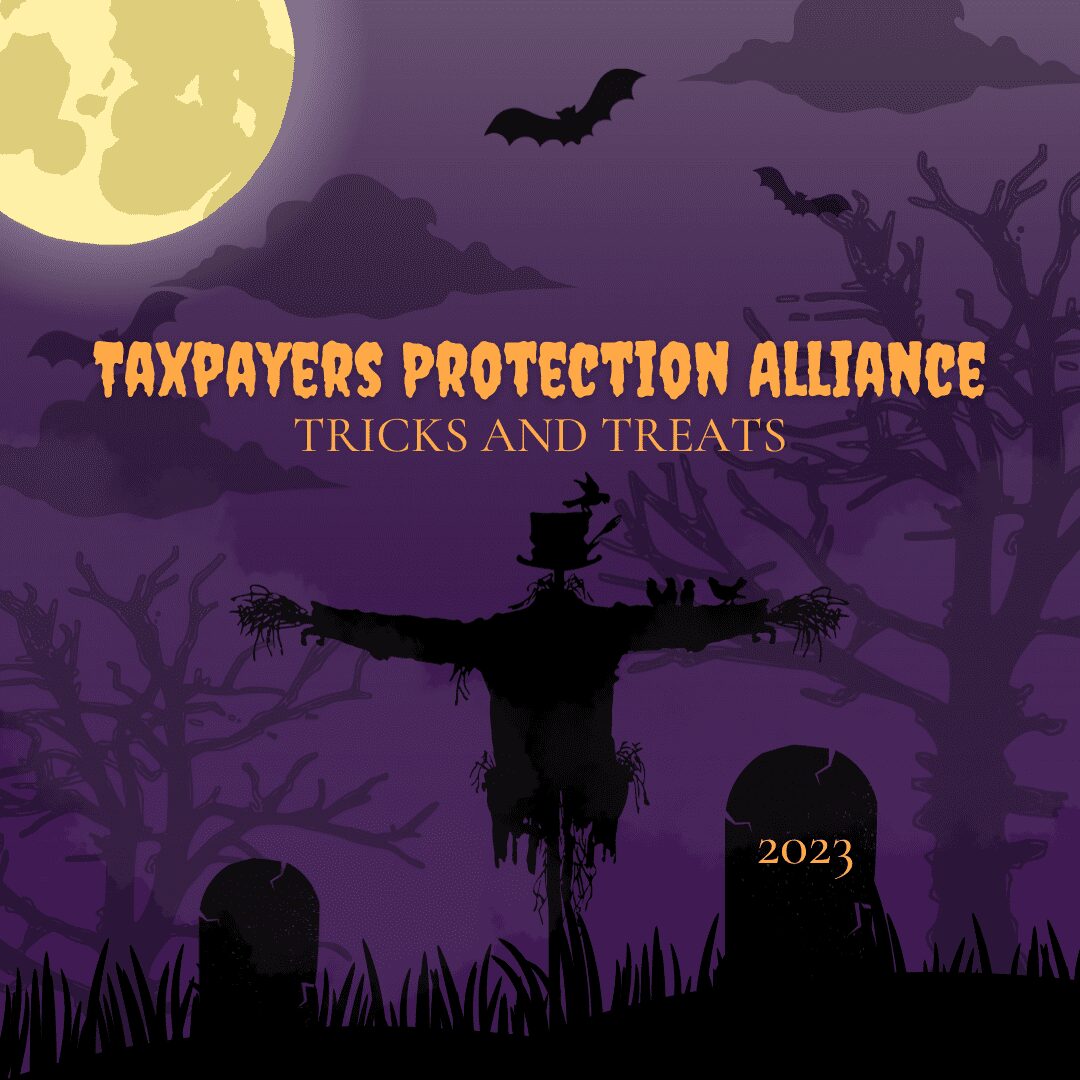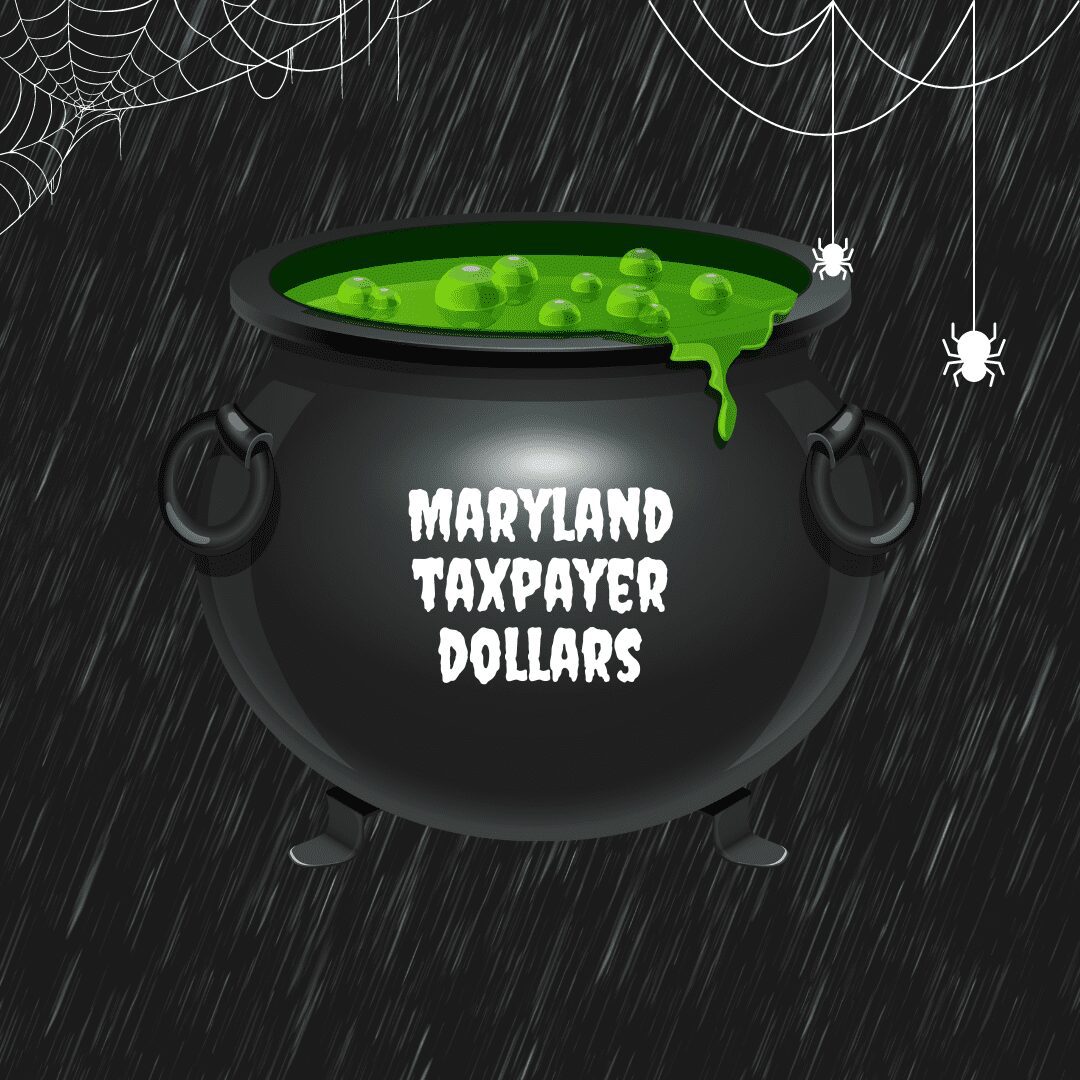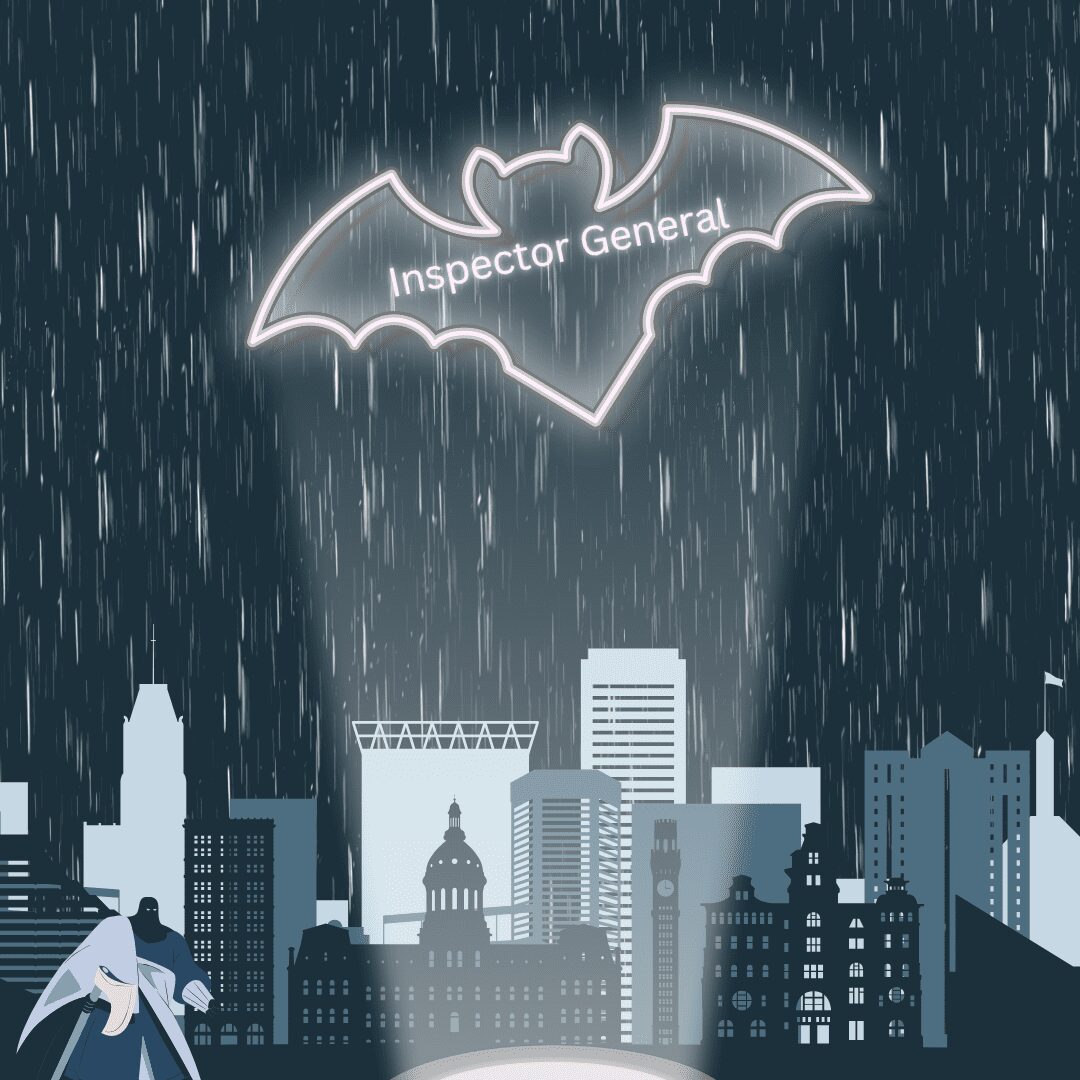
Taxpayer Tricks and Treats 2023
Taxpayers Protection Alliance
October 31, 2023
Halloween is almost here, and there’s plenty to give taxpayers some fiscal fright. The disembodied hand of bureaucracy has been busy grabbing more goodies than a tired trick-or-treater fishing for the final Snickers. The national debt is now an astounding $33 trillion, resulting in a gusher of red ink that would make Count Dracula giddy with excitement. Meanwhile, zombie government agencies continue to run amok despite having long outlived their usefulness. If you’re afraid of bureaucrats who go bump in the night, fear not; the Taxpayers Protection Alliance (TPA) has a flashlight on hand and some extra garlic just in case. Without further a-boo, TPA presents 2023 Tricks and Treats for you.


The Haunted Shopping List, or...Rising Inflation
Nostalgic Spongebob fans will recall with horror the haunted shopping list that a sleeping Spongebob woke up to one spooky night. The paranormal piece of paper was in fact a devious scheme cooked up by Mr. Krabs to get Spongebob to give up his beloved hat. But, rising inflation is no illusion to millions of American households. According to recent reporting by USA Today contributor Paul Davidson, “Annual inflation has fallen since hitting a 40-year high of 9.1% in June 2022 but, at 3.7% in September, is still well above the Federal Reserve’s 2% target.”
The government has resorted to spooky interest rate hikes to tame inflation, but not without throwing the economy into disarray and making life more difficult for millions of lenders. The real solution to inflation is getting spending under control, but unfortunately, there are no credible plans to do so anytime soon. Americans deserve a shopping list that doesn’t send shivers down their spines.
The Floating Apparition of Drug Safety
It’s easy for ghouls, or federal agencies, to play cruel tricks on naïve souls. In the case of the Food and Drug Administration (FDA), bureaucrats would like Americans to believe that onerous regulations are keeping consumers safe from harm. In reality, the $2 billion cost of getting a drug to market threatens to dry up the pipeline of life-saving treatments. While the FDA’s insistence on clinical trials is a reasonable one, the agency often makes poorly reasoned rejections of medications targeting rare diseases. One poorly reasoned rejection centered around a medication called omburtamab, designed to treat a rare pediatric brain cancer.
Agency officials expressed concern that the datasets used to study the drug were too old to be reliably interpreted, even though the FDA acknowledged that, according to the evidence, patients taking omburtamab live 7-12 months longer than their non-medicated peers. As TPA’s 2023 report on drug approvals points out, omburtamab is hardly the only medication to be given this treatment. Patients looking for cures deserve more than an illusory orb of hope.


Title II is Back from the Dead
You can drive a stake in a vampire, but he’ll probably be back for the sequel. Unfortunately, bad policies usually also have sequels. In 2017, then-Chairman of the Federal Communications Commission (FCC) Ajit Pai wisely rolled back costly utility-style regulations on the internet, freeing up investment dollars and unleashing the digital domain. Not learning from past mistakes, current FCC Chairwoman Jessica Rosenworcel has expressed an interest in bringing back the Title II classification of the internet as a common carrier service. Now that she has a 3-2 Democratic majority on the commission, that could come to fruition.
If policymakers had any sense, Title II would stay dead and buried. The Phoenix Center for Advanced Legal and Economic Public Policy Studies found that investment into broadband infrastructure dropped by 20 percent to 30 percent between 2011 and 2015. This is when Obama took office and then FCC Chairman Julius Genachowski began discussing the Title II reclassification under the Communications Act of 1934. Clearly, Title II is the vampire’s garlic to growth and prosperity. The horror of people being blocked was only an apparition because a Taxpayers Protection Alliance Foundation investigation found very few instances of throttling or blocking traffic by providers after the so-called net neutrality rules were removed.
WHO Stole the Fog Machine from the Party?
The best Halloween parties are shrouded in vapor, sparking fright in guests trying to separate friend from fiend. Unfortunately, the World Health Organization (WHO) hasn’t gotten the memo and will stop it nothing to cast a fog on reputable scientific research. Despite a wealth of evidence that harm-reduction products such as vapes are 95 percent safer than conventional tobacco products, Tedros Adhanom Ghebreyesus (the WHO’s director-general) has come out strongly against the products. This blowhard stated the organization’s opposition against THR when he said “it is not true” that vaping can be used as a public health harm reduction measure. He further stated that positioning e-cigarettes as harm reduction “is a trap.”
In November, the Parties of the anti-smoking contingent of the WHO – the Framework Convention on Tobacco Control (FCTC) – will convene their 10th Conference of the Parties (COP10) to discuss a litany of policies countries can undertake to reduce the burden of combustible cigarettes. It has been hinted that COP10 will focus on stopping the emergence of tobacco harm reduction products, specifically electronic cigarettes, heated tobacco products, and nicotine pouches. Let’s hope that the fog clears and global bureaucrats see the public health benefits of THR products with greater clarity. TPA will be in Panama with more than 30 experts and media to clear the air about vaping.


The Shapeshifting Skinwalker, or the Federal Trade Commission
In a perfect world, federal agencies would stay in their lanes and hew closely to their core missions. The Federal Trade Commission (FTC) would actually protect consumers against cartels and deceptive practices instead of shapeshifting into an all-encompassing, wild-ghoul-chasing monstrosity. In late September, the FTC filed suit against Amazon as an alleged monopolist (in two relevant markets) that uses putatively illegal business practices to fortify its market dominance. The agency targets as “unfair” Amazon’s policies that discourage sellers from offering lower prices elsewhere and that tie the benefits of Amazon Prime to the company’s in-house fulfillment service.
Understanding Amazon’s place in the digital economy, and in the hearts of Americans, reveals fully the FTC’s malfeasance and how out of touch the agency is. Amazon has won its success as a marketplace and order fulfiller by offering innovative services that profit third-party sellers and provide consumers savings and convenience. For sellers, it offers a vast (and previously unreachable) customer base. Users may reliably assume that the products it lists and promotes are of good quality, competitively priced, and quickly deliverable. But that’s not enough to convince an agency hell-bent on kiboshing companies it doesn’t like. Amorphous agencies sure are a scary sight.
Bureaucratic Ghosts… They’re Everywhere!
Normal, everyday bureaucrats are spooky enough. They can crush your home or business under the weight of their regulatory schemes. They can make your hard-earned taxpayer dollars disappear. However, bureaucratic ghosts are far spookier. They – much like regular ghosts – can be seemingly alive and present, but also invisible and undetectable at the same time. These bureaucratic ghosts are popping up in a number of administrative agencies.
At the Consumer Financial Protection Bureau (CFPB), these bureaucratic ghosts are called “fellows.” These bureaucratic ghosts came in under the guise of helping staff plan priorities. However, defying the laws of transparency as ghosts are prone to do, they morphed into staffers who greatly impacted agency policymaking, despite not actually being political appointees.
At the Department of Labor (DOL), Julie Su has served as acting secretary of the agency, despite it being clear, she does not have the support to pass a Senate confirmation for the role. Further, in a bid to become the most powerful bureaucratic ghost of them all, the Biden administration recently put Su in the presidential line of succession. Like a ghost, Su has just materialized and is here to haunt with policies that will doom independent contractors and franchisees across the nation.
Lastly, Ann Carlson haunts the National Highway Traffic Safety Administration (NHTSA) after having been selected to lead the agency. After Biden nominated her, she – like Julie Su – failed to get Senate confirmation. Yet, she still runs the agency on an acting basis and shapes policies that make traveling and affording a car a nightmare.
The federal government needs some Ghostbusters soon if they are to prevent more of these bureaucratic ghosts from haunting us all.


Maryland Politicians Brew Up Potion of Fiscal Commotion
It’s hard to know what kind of potion witches are stirring up until…you’re already under a wicked spell. Similarly, politicians will often say that you need to pass a spending bill to find out what’s in it. Maryland taxpayers may not have a full picture of future state spending, but they know it isn’t a pretty sight. According to a June report by Maryland’s Department of Legislative Services, Maryland will have a $1.8 billion structural deficit by 2030. When asked about his plans to keep the deficit under control, Governor Wes Moore stated the need to be “bold” and expand state hiring while also being “fiscally responsible with the way we do it.”
TPA President David Williams rightly pushed back, noting “You don’t want to ask Maryland taxpayers for any more money. What it boils down to is fiscal responsibility, cutting spending, and looking at the core issue that government should be taking care of.” It’s time for the Governor and lawmakers to get off their high broom and read the room. From the Kirwan Commission to the Baltimore City Red Line, taxpayers will be haunted for many years by the costs of these projects if the Governor doesn’t cut these from the bloated budget.
“Safe Streets” is a Slasher Film on Repeat
Seeing the guts and gore in horror movies can be hard to stomach, but rest assured, it’s all concocted in a Hollywood studio. That’s sadly not the case with out-of-control violence in Baltimore. “Charm City” has more than 300 murders per year, and residents complain that the city isn’t doing all that it could to protect them. Even basic things like riding a bicycle can turn into a life-threatening ordeal in the struggling city.
The city has tried a program called “Safe Streets” to reduce the carnage, in which “violence interrupters” are deployed to try and mediate disputes. But recently, the program has come under significant fire for wastefully spending taxpayer dollars. A FOX45 News investigation found that “Safe Streets employees spend thousands of taxpayer dollars at stores like DTLR, Shoe City, GameStop and Forever 21…Safe Streets employees [also] traveled to a conference in Los Angeles earlier this year using American Rescue Plan (ARPA) COVID-19 relief funds.” When questioned about these mysterious expenditures during a July hearing, Safe Streets disappeared into the night like a ghost afraid of its own shadow.


The Grim Auditor
The Internal Revenue Service’s (IRS) Grim Auditor can’t be trusted to safeguard personal tax information or be given the responsibility to prepare taxes. On October 12, 2023, an IRS contactor pled guilty to leaking the private tax data of thousands of wealthy Americans to the news media. While this serious crime carries up to a five-year prison sentence, the larger consequence is the continued erosion of public trust in the IRS, which has shown itself to be a flagrantly poor arbiter of taxpayer data. The IRS has spooked taxpayers and Congress by building a pilot program to push government-run tax preparation system onto Americans even before the administration’s so-called “independent” study on the subject was complete. The IRS unilaterally built a pilot program to give itself the power to prepare and file tax returns without Congressional approval and before a study on the feasibility of such a system was even completed.
The Grim Auditor also comes after lower income folks to haunt their fiscal dreams. According to IRS audit data, the most frequently audited county in the United States is Humphreys County, Mississippi. This rural county near the Mississippi Delta is known for catfish farming and has an average income of $18,000 per resident, making it among the poorest in the nation. Yet, Humphreys’ residents get audited far more often than those in cities such as New York, Chicago, or Los Angeles. IRS Commissioner Charles Rettig testified before Congress and was asked about the disproportionate targeting of poorer Americans for audit scrutiny. He answered bluntly, “[This is] the most efficient use of available IRS examination resources.” He would later justify this by explaining that poorer Americans from disadvantaged communities are easier to audit because they themselves do not have the resources to fight back. Thus, they require less time and money on the part of the IRS.


Monoclonal Antibodies Help Immune System Go Ghostbusters
“Who ya gonna call?” Hopefully the Ghostbusters, but if they’re not available, Rep. Dan Crenshaw (R-Tex.) is a good backup. In a recent letter to the FDA, the congressman along with Rep. Lori Trahan (D-Mass.) demanded information on the agency’s plan for authorizing new monoclonal antibodies and antiviral therapeutics. These biotechnologies have been critical in the fight against COVID-19 and have helped neuter the deadly disease into an annoying poltergeist. Yet, the FDA hasn’t exactly been eager to toss its risk aversion into the dust bin.
The lawmakers wrote, “While the FDA has modernized its process in the past for influenza vaccines and pioneered an unprecedented public-private partnership through the multi-agency Operation Warp Speed for COVID vaccines, we fear it has not provided the same attention to other interventions. Our foremost concern is that new variants are developing faster than current FDA emergency use authorization (EUA) reviews can be completed – all despite the continued innovation to update drugs and biologics for a changing virus.” Hopefully, biotech developers won’t be haunted by beyond-the-pale regulations.
The Shining IG Office that Overlooks a Troubled City
Much like a haunted hotel, Baltimore has horrors everywhere you look. There are inspector bribes, crooked politicians, costly police misconduct, and the list goes on. Fortunately, Baltimore Inspector General Isabel Cumming is there to keep her city in high spirits. Days after being chosen as Baltimore’s IG in 2018, Cumming made clear that “nobody is off-limits. Overtime situations, theft of time. Purchase cards. There are so many areas that need to be looked atI love going after white-collar criminals.” At the time, then-Mayor Pugh sung her praises, stating Cumming “knows how to operate independently to be fair and just.” After media reports revealed that then-Mayor Pugh had cozy financial ties to the University of Maryland Medical System (UMMS), the IG’s office began to take a closer look at the city leader’s money dealings. Before long, Mayor Pugh was on her way to prison, and Baltimore residents were (temporarily) free of criminal leadership.
Since then, the IG has saved Baltimore taxpayers millions of dollars and ramped up the fight for a fairer, more honest city administration. Over the past year, her office has saved taxpayers $7 million and fielded more than 1,000 hotline complaints. IG Cumming has shone greatly in her fight against fiscal fright.


Happy Halloween from the Taxpayers Protection Alliance and don’t let the government goblins scare you too much this year.
